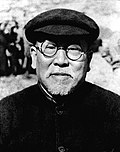| No. | Portrait | Name (Birth–Death) | Term of office | Important offices held during tenure | Premier | Ref. |
|---|
| Took office | Left office | Term |
|---|
| Minister of the Interior of the Central People's Government |
|---|
| 1 |  | Xie Juezai
谢觉哉
(1884–1971) | 19 October 1949 | 28 September 1954 | 4 years, 344 days | Member of the Legislative Affairs Commission of the Central People's Government
Member of the Political and Legal Committee of the Government Affairs Council | Zhou Enlai | [3] |
|---|
| Minister of the Interior of the People's Republic of China |
|---|
| 1 |  | Xie Juezai
谢觉哉
(1884–1971) | 28 September 1954 | 29 April 1959 | 4 years, 213 days | | Zhou Enlai | [3] |
|---|
| 2 |  | Qian Ying
钱瑛
(1903–1973) | 29 April 1959 | 23 November 1960 | 1 year, 208 days | Secretary of the Party Leadership Group of the Ministry of the Interior | |
|---|
| 3 |  | Zeng Shan
曾山
(1899–1972) | 23 November 1960 | 11 December 1968 | 8 years, 18 days | Member of the CCP Central Committee | [4] |
|---|
| From 11 December 1968, the post of Minister of the Interior was abolished. On 5 March 1978, the post of Minister of Civil Affairs was established. |
| Minister of Civil Affairs of the People's Republic of China |
|---|
| 4 |  | Cheng Zihua
程子华
(1905–1991) | 5 March 1978 | 4 May 1982 | 4 years, 60 days | Secretary of the Party Leadership Group of the Ministry of Civil Affairs
Vice Chairman of the Chinese People's Political Consultative Conference | Hua Guofeng
↓
Zhao Ziyang | [5] |
|---|
| 5 |  | Cui Naifu
崔乃夫
(1928–2023) | 4 May 1982 | 29 March 1993 | 10 years, 329 days | Secretary of the Party Leadership Group of the Ministry of Civil Affairs | Zhao Ziyang
↓
Li Peng | [6] |
|---|
| 6 |  | Doje Cering
多吉才让
(born 1939) | 29 March 1993 | 17 March 2003 | 9 years, 353 days | Deputy Director of China International Committee for Disaster Reduction | Li Peng
↓
Zhu Rongji | [7] |
|---|
| 7 |  | Li Xueju
李学举
(born 1945) | 17 March 2003 | 25 June 2010 | 7 years, 100 days | Member of the CCP Central Committee | Wen Jiabao | [8] |
|---|
| 8 |  | Li Liguo
李立国
(born 1953) | 25 June 2010 | 6 November 2016 | 6 years, 134 days | Secretary of the Party Leadership Group of the Ministry of Civil Affairs
Member of the CCP Central Committee | Wen Jiabao
↓
Li Keqiang | [9] |
|---|
| 9 |  | Huang Shuxian
黄树贤
(born 1954) | 6 November 2016 | 26 October 2019 | 2 years, 354 days | Secretary of the Party Leadership Group of the Ministry of Civil Affairs | Li Keqiang | [10] |
|---|
| 10 |  | Li Jiheng
李纪恒
(born 1957) | 26 October 2019 | 28 February 2022 | 2 years, 125 days | Secretary of the Party Leadership Group of the Ministry of Civil Affairs | [11] |
|---|
| 11 |  | Tang Dengjie
唐登杰
(born 1964) | 28 February 2022 | 29 December 2023 | 1 year, 304 days | Secretary of the Party Leadership Group of the Ministry of Civil Affairs | Li Keqiang
↓
Li Qiang | [12] |
|---|
| 12 |  | Lu Zhiyuan
陆治原
(born 1964) | 29 December 2023 | Incumbent | 1 year, 326 days | Secretary of the Party Leadership Group of the Ministry of Civil Affairs
Member of the CCP Central Committee | Li Qiang | [13] |
|---|










